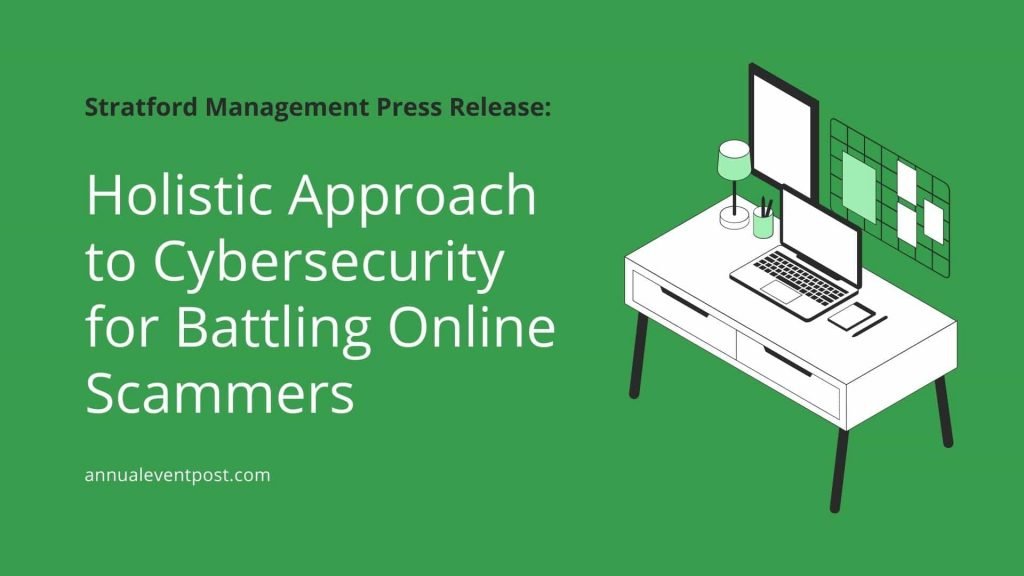
In line with its mission of delivering holistic wealth management services, Stratford Management has released new cybersecurity recommendations for the increased online security of its clientele. With incidences of online phishing, fraud, and scam activity on the rise, putting in place cybersecurity measures that protect against all such threats is vital.
With most individuals and businesses using a variety of online platforms to run their day-to-day tasks or to increase brand awareness, a rounded approach to cybersecurity works best. Not only is it necessary to protect personal and business email accounts, but also any social media accounts, webpages, and any installed programs or applications used. This includes the protection of not only company hardware but also any mobile devices like phones or tablets, that are intermittently connected to your network.
- Anti-Malware
Having decent anti-malicious software installed is imperative in the protection of all data assets. Online security threats that directly attack your email include phishing emails that try to get information out of users, and spam emails containing clickbait or attachments that contain viruses. Good firewall protection and virus detection software will help in the battle against these threats. But there is always the threat of users being tricked into opening attachments that release viruses or clicking on malware clickbait.
Online virus criminals have become ever more sophisticated at disguising themselves as recognized brands. They can even impersonate contacts that you interact with regularly. One of the best things to do is to practice awareness.
Check the identity of contacts that you correspond with through a multifactor identification process if possible. For example, if you receive an invoice from a vendor that you interact with regularly, stating that there is a change to their bank details log a call with the supplier first, before making any payments to the new account. Confirming the changes first can help protect against a common type of fraudulent activity that uses invoice imitation to prompt payments.
Taking five minutes to verify these kinds of details can save time and money down the track if the contact turned out to be a fake impostor.
- Update Software Regularly and Back-Up All Files
Updating software regularly and upgrading hardware before it becomes out-of-date is another key cybersecurity measure. It’s easy to set in place regular automated updates. These can be timed to coincide with hours when the least work is done, so systems aren’t slowed down unnecessarily.
Scheduling regular backups is also important for the security of your systems. Backups should also include offline content dumps, preferably stored off-site. Having a recent backup is one of the best insurance measures you can put in place if your systems are targeted in an online attack. Restoring to the most recent version of your workflow will often prove more timesaving than trying to rebuild or fix hacked data.
- Increase Password Security
Switching all logins to multi-factor verification helps aid in the prevention of identity theft. This is especially pertinent for accounting, banking, or financial purposes. Multi-factor verification can comprise an online password login, coupled with an SMS verification code sent to a separate mobile device, or the use of an encryption key.
Fingerprint technology can also prove extremely secure, as an A.I. enhanced facial recognition device. These types of identification measures have become more accessible with the latest technological tools and advancements.
- Shared Networks
Most businesses rely on some kind of shared network, whether it be the shared use of a server or access to common Wi-Fi.
If you are doing business on the go, it can be tempting to access public Wi-Fi servers, but these offer a minimum level of security. If possible, wait until your remote Wi-Fi services are operational to check work emails. Especially be careful of downloads or clickbait that is often more prevalent when signing into public Wi-Fi.
Taking steps to address all areas of cybersecurity is one of the best things you can do to protect yourself and your business from online security threats. These can run the full gamut of pharming, impersonation, fake apps, malware, and fake profiles. Make sure that if you decide to engage in business with a new contact or member of a new network that you run a double verification check first. Taking the extra time for due diligence checks will prove worthwhile, as it can help you avoid falling prey to cybercrime.
A holistic approach to cybersecurity starts and ends with each user. Early detection of possible threats relies on users educating themselves in cybersecurity threats.
As global leaders in asset management, wealth management, portfolio management, and estate planning, Stratford Management would like to remind its clients never to disclose passwords either online or via phone.
Brade Pro has a strong background in generating interesting content that gives a blog, website, or business true value. He is a technology geek and loves to talk about tech.